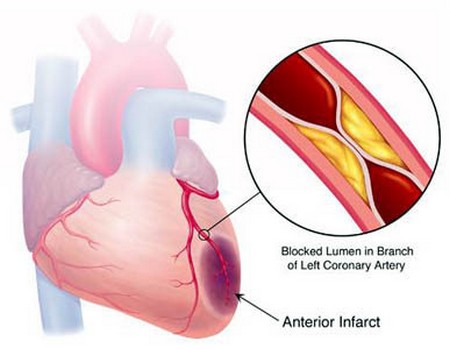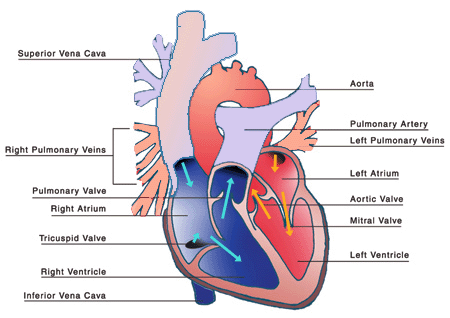There are so many diseases that affect your heart or blood vessels in one way or another. These diseases are collectively named as ‘Heart Diseases’. The Heart Disease is an umbrella term used for the plurality of diseases of your blood vessels such as heart rhythm problems (arrhythmias), heart defects you are born with (congenital heart defects), and coronary artery disease.
The term ‘heart disease’ refers to the conditions that involve the narrowed or blocked blood vessels that can cause a stroke, heart attack and a chest pain or angina. The term is often used interchangeably with ‘cardiovascular disease’. There are certain diseases which are categorized under the term heart disease. These diseases include: infections, diseases related to heart muscles, valves or beating rhythms.
Heart disease is considered as the severe condition both in men and women and can be sometimes extremely fatal. It is common all over the world including United States. In United States, heart disease alone is responsible for 40 percent deaths. There are many heart diseases which can be cured or prevented through healthy lifestyles choices, exercises and diet.
Coronary Heart Disease
Coronary heart disease or simply coronary disease is a condition that refers to the failure of coronary circulation to supply adequate circulation to cardiac muscle and surrounding tissue. This is a common heart disease which is considered as the major factor in premature deaths in New Zealand, Europe, North and South America, Australia, the Baltic States and Russia. There are predictions saying that all the regions of the world will be affected by this disease by 2020.
Generally, the coronary disease is often compared with atherosclerotic coronary artery disease, but there can be other causes behind it such as coronary vasospasm. There is possibility that the stenosis is caused by the spasm.
Heart Attack
Heart attack is one of the severe conditions of heart diseases. In heart attack, the heart stops getting the required percentage of oxygen necessary to perform different functions. Heart attack is considered as a major reason for death all over the world. In United States, one out of six deaths is caused by heart attack. Myocardial Infarction is another name given to heart attack.
For proper functioning, heart requires a steady supply of oxygen to pump the blood effectively to all the body organs. Coronary arteries are the main source to supply oxygen to the heart in the blood. Once the coronary artery becomes obstructed, the heart will not be able to get the oxygen rich blood from that particular artery and get damage. This in turn damages the heart tissue. This condition is medically called as myocardial necrosis or infarction.
Hypertension
Hypertension, commonly known as high blood pressure is another severe and common heart condition which can lead to several health problems. Hypertension normally causes coronary heart disease, heart failure, stroke and kidney failure. According to survey conducted by the National Heart, Lung and Blood Institute, every one in three adults in United States have hypertension or high blood pressure.
Generally, hypertension is classified into three subfields: Essential hypertension is caused for some unknown reasons. Secondary hypertension is a condition caused by some other disease process or condition. Systolic hypertension is a condition common in older people and is caused when the systolic blood pressure number is high. When it comes to treatments for hypertension, it all comes down to the specific classifications.
Ischemic Heart Disease
Doctors normally describe ischemic cardiomyopathy as a condition where patients have a reduced heart pumping or squeezing due to coronary artery disease. Such patients often experience congestive heart failure.
Ischemic Cardiomyopathy can be taken as three terms, i.e. ‘ischemic’ which means an organ is not getting proper blood and oxygen, ‘cardio’ which means heart and ‘myopathy’ which means muscle-related disease.
Arrhythmias
This condition is related to abnormal or irregular heart beat or rhythm. It is also known as ‘cardiac arrhythmias’. Arrhythmias can be of different types, i.e. from mild to severe or even life threatening. In arrhythmias the heart can beat in an irregular way, too rapid (tachycardia), too slow (bradycardia), or stop beating (asystole).
Heart Murmur
Heart murmur is a condition where heart produces extra sounds due to unstable blood flow. Normally, the heart murmurs can only be heard with the help of stethoscope (on auscultation).
Physiological murmur or functional murmur is a condition in which heart murmur principally due to physiologic conditions outside the heart. These are normally considered as benign or innocent murmurs.
However, there can be other reasons behind heart murmuring such as narrowing or leaking of valves, or the presence of abnormal passages through which blood flows into the heart. These types of murmurs are known as pathologic murmurs.
Rheumatic Heart Disease
In past, rheumatic (roo-mat-ik) heart disease was considered as the worst heart disease of childhood and adolescence. In rheumatic heart disease, the entire heart and its membranes get damage.
It is caused due to the rheumatic fever which is caused by the streptococcal bacterium. This bacterium is a major factor that causes rheumatic fever and eventually the patient suffers from rheumatic heart disease. It is has been controlled to a large extent with the use of antibiotics.
Pulmonary Heart Disease
A heart disease caused by lung (pulmonary) disorder is known as pulmonary heart disease. Due to the slowed of blocked blood flow into the lungs, the lung pressure increases as a result the right side of the heart has to push harder against the increased lung pressure which in turn results in the enlargement of the heart muscle. This may sometimes cause the failure of the right side of the heart. Some chronic lung conditions such as advanced emphysema, pulmonary hypertension and cystic fibrosis can also cause pulmonary heart disease.
Hypertensive Heart Disease
Hypertension itself is considered as a common heart disease, but there are certain other heart diseases which are caused directly or indirectly by high blood pressure. Some of the prominent heart diseases that can be caused by hypertension include: congestive heart failure, coronary heart disease, cardiac arrhythmias, thickening of heart muscles, and several other symptoms.



